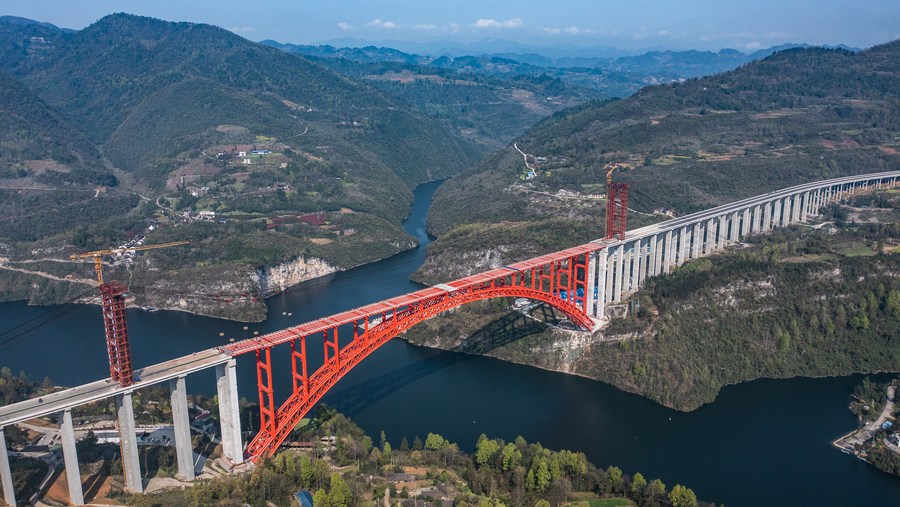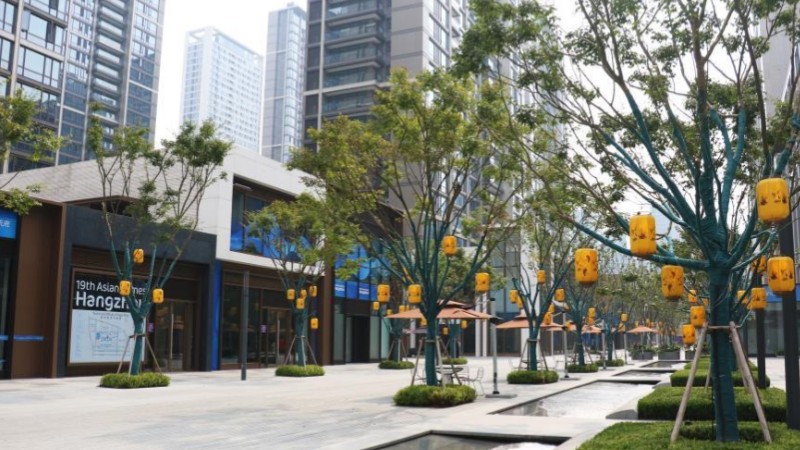Ferries flowing into history in remote China

This aerial photo taken on July 11, 2023 shows a view of a section of the Wujiang River in Zhucang Township of Weng'an County, southwest China's Guizhou Province. (Xinhua/Yang Wenbin)
GUIYANG, Sept. 14 (Xinhua) -- Lu Xiyong treasures a photograph capturing him holding a bamboo pole to push the ferry away from the shore.
The photo was taken in 2022. On that very day, he returned the boat he had worked on for 18 years to the government, bidding farewell to his days as a ferryman.
Lu, 60, lives in Fengyan, a small village next to Wujiang River in Weng'an County, located in southwest China's Guizhou Province.
Situated on the eastern side of Wumeng Mountain, Wujiang River is considered the mother river of Guizhou. The flowing river water has nourished neighboring villages while also hindering the travel of villagers. During the days of poor road infrastructure, ferries served as a primary mode of transportation for locals.
However, with the expansion of rural road networks in the mountainous areas, ferries have gradually faded into history.
Shuangchi Ferry Dock, where Lu used to work, had a history of up to a century.
"Villagers turned to ferries when visiting relatives or going to market fairs. It was normal to ferry more than a dozen times a day," Lu recalled. "But the road conditions alongside the river were poor. It took up to an hour for villagers to trek to the dock."
Lu said he cannot recall precisely when the decline in ferry passengers began. After the road facilities improved, it's now only a 10-minute drive to the dock.
"More roads mean less demand for ferries," he said, adding that less cargo was delivered by ferries.
In addition to farming, Lu now volunteers to collect garbage from the river water.

Lu Xiyong (R) and Ran Maoying, Lu's wife, clean up floating garbage on the Wujiang River in Zhucang Township of Weng'an County, southwest China's Guizhou Province, July 11, 2023. (Xinhua/Yang Wenbin)
Huang Jiangkai, deputy head of the county's transport bureau, said the county has formed a road network of six expressways and more than 1,500 km of rural roads.
"Ferries have been replaced by roads," said Huang, adding that the number of ferry docks in the county's four townships along the river has declined from 11 to one since 2022.
In Yuqing County, Maluo Ferry Dock is one of the only four ferry docks that are still in operation, while the other 23 have all closed.
Shang Kongli and his wife are the third generation of his family engaged in the ferry business.
Shang said that their business was running well when they took over from their uncle in 2011, with dozens of passengers crossing the river daily during peak periods.
In 2015, when an expressway became operational, cutting the travel time from their village to the other side of the river to half, the number of villagers using the ferry dwindled significantly.
To make a living, Shang decided to leave the ferry boat to his wife and he went to the provincial capital Guiyang to find a job. Song Meimai, Shang's wife, was engaged in orange farming to earn extra income.
According to Song, while enhanced transportation options have impacted the ferry business, they have also been compensated for their losses in another way.

This aerial photo taken on March 30, 2023 shows the Wujiang grand bridge, a main project on the expressway linking Dejiang and Yuqing, in southwest China's Guizhou Province. (Xinhua/Tao Liang)
"In the past, I had to carry oranges, pigs and other agricultural products down the mountain for sale. Now, the buyers can directly drive to our doorstep, saving much time and making the sale much easier," said Song, 33.
Gao Zhan, a transportation official in the county, said that over 2,000 km of rural roads have been built in the county, and every township is accessible via an expressway within a 20-minute drive.
"Wujiang River is no longer an obstacle for transportation. Ferries have gradually become history," said Gao.
China, with a vast rural area, has built or upgraded 1.25 million km of rural roads over the past five years. All townships and villages where conditions permit are now connected by paved roads and linked to bus networks, according to the government work report released earlier this year.
Photos
Related Stories
- Growth of a Miao embroidery workshop in Guizhou province
- World's first alpine canyon landscape cable-stayed bridge under construction in Guizhou
- Pic story: rural teacher sticks to position in China's Guizhou
- 2023 Int'l High Bridge Extreme Sports Invitational Tournament held in Liupanshui, SW China
- Scenery of Lali terraced fields in Yanshan Township, SW China
Copyright © 2023 People's Daily Online. All Rights Reserved.









